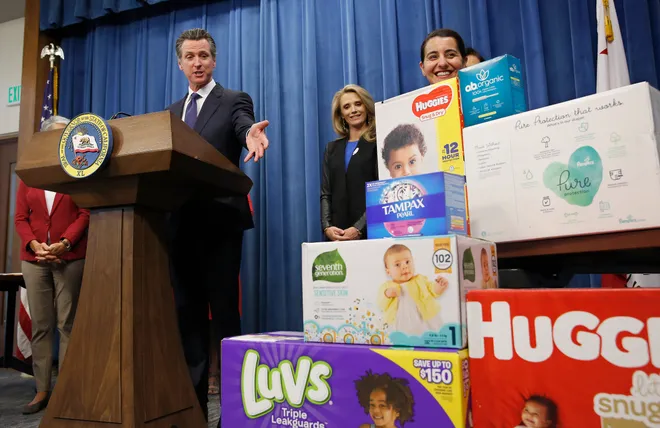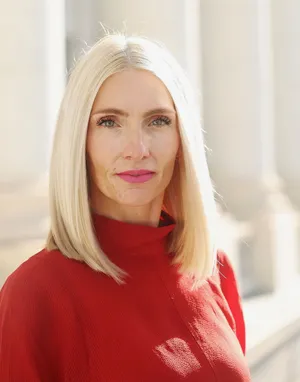We got free period products in school bathrooms by putting policy over politics
To the surprise of many, Utah became the first state in the nation last year to unanimously support making free period products available in all K-12 school bathrooms, followed a year later by providing free period products in all state buildings.
The celebration was marked by Lt. Gov. Deidre Henderson, a former state senator, standing before the news media and a sea of pink-clad supporters, announcing that the white pants she sported that day were a reminder of the number of Senate votes she had missed during her career at the Capitol because of a lack of access to period products.
For the state that boasts the strongest economy – including employment, growth and education – legislative outcomes of issues impacting women have rarely, if ever, garnered unanimous support. In fact, Utah also finds itself ranked 50 out of 50 for women’s equality.
These extremes beg for policy over politics.
In 2019, after years of all-male legislative committees tossing out the idea of ending the "tampon tax" without debate, I sat in the office of a state representative, burning to explain the critical need to create policy around menstruation.
Nervous, I described how any issue that involuntarily affects 50% of the population for four to seven days a month, for 40 years in the span of a life, was by nature a key factor in outcomes of education, privacy, public health and the economy. I locked eyes with him and added that because of the spontaneous nature of periods, it would be by the grace of God that I’d make it through the meeting without leaving my own personal mark on his couch.
He became an avid supporter.
Period poverty:It's past time we ended the stigma – and tax – on periods for girls around the world
Utah put policy over politics. The nation should follow.
From that moment on, period policy became a movement unlike others – one that put policy above politics.
And because of that, the movement looked different. It did not look like the polished lobbyists or political strategists of the Capitol. It looked like dads at rallies, supporting their daughters who wanted to be a part of something bigger than themselves. It looked like women with strollers and kids realizing just how much their voices echoed in those marble halls.
It looked like handwritten signs proclaiming, "Girls are worth it. Period." Like philanthropists understanding that investing in policy meant dollars reaching every corner of a state. Like teenagers wanting social change and Wednesday-workout groups giving their extra time for good. It looked like hijabs, high-tops and hipsters.
There was no distinction among parties. No one-sided political ideology that blocked passage or made ridiculous demands. Just movement. Momentum. And a thirst for thoughtful, economically and equitably sound change.

Period products are just the start
Since that time, the nonprofit I lead, The Policy Project, has been able to identify other overlooked needs in our community. We secured statewide funding for more than 60 teen resource centers in high schools focused on providing services for students experiencing homelessness and other mental and physical hardships to meet their basic needs. This includes laundry, food pantries, showers and toiletries, family advocate workers and mental health support. Utah is first in the nation to do this.
The movement to end hunger is underway.We support families battling food insecurity.
There is so much more good to be done. Our plan for 2024: child sexual abuse prevention.
And the idea is spreading. We are now helping tackle issues with partners in Idaho, Oregon, New Mexico and as far east as Alabama.
The Policy Project is establishing a track record of generating unanimous support in the legislature and creating a blueprint that other states can use to navigate beyond political and territorial lines to accomplish public and societal good.
Our mission is straightforward – remove barriers to opportunity by going upstream – creating solution-based policy at all levels of society, recognizing that issues are not right or left. Issues are human.
We have discovered that in an environment where the majority is exhausted by the margins of the political spectrum, there is a deep hunger for something that feels like progress. Like we’re using the extreme access to wealth, education and opportunity to move the needle for everyone in society. That if we, as citizens, create that demand for healthy, moderate policy, our politicians will have to respond.
Policy trumps politics.

Emily Bell McCormick is the founder of The Policy Project, a U.S. nonprofit that creates movements in order to forward healthy, long-term policy at a state and national level.
Disclaimer: The copyright of this article belongs to the original author. Reposting this article is solely for the purpose of information dissemination and does not constitute any investment advice. If there is any infringement, please contact us immediately. We will make corrections or deletions as necessary. Thank you.







